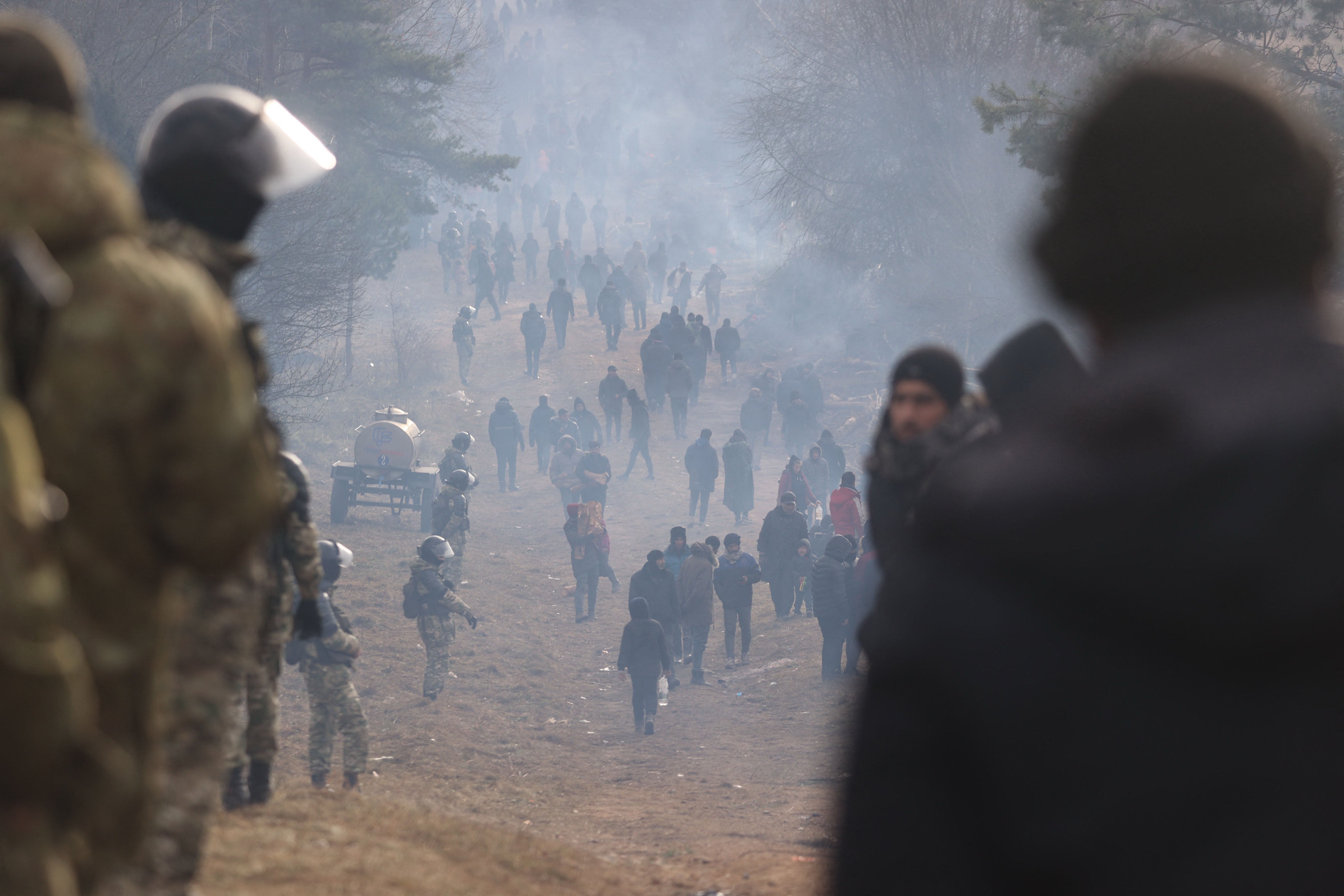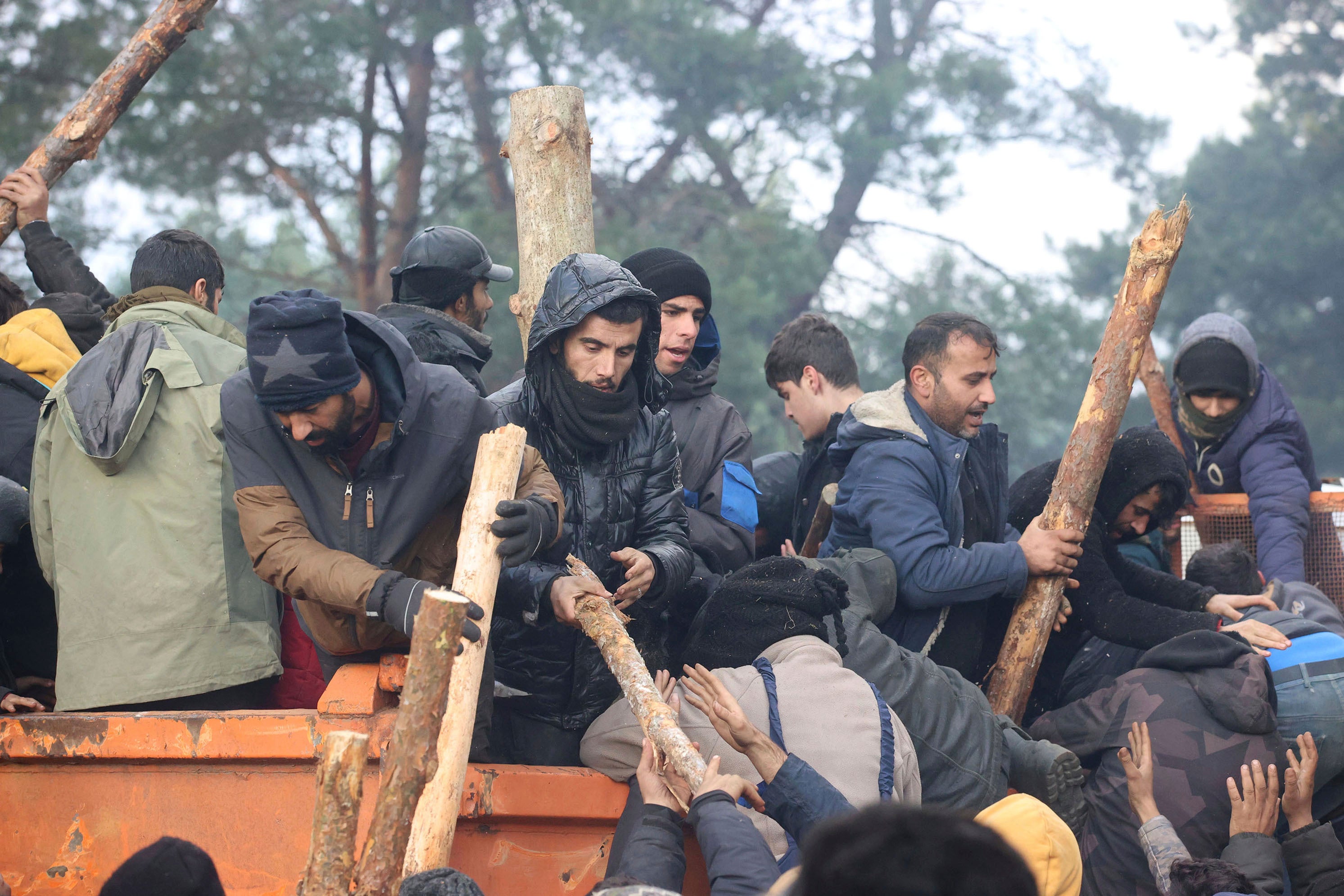Britain sends troops to Poland border as migrant crisis worsens
The troops will ‘provide engineering support’, says the Ministry of Defence

Your support helps us to tell the story
From reproductive rights to climate change to Big Tech, The Independent is on the ground when the story is developing. Whether it's investigating the financials of Elon Musk's pro-Trump PAC or producing our latest documentary, 'The A Word', which shines a light on the American women fighting for reproductive rights, we know how important it is to parse out the facts from the messaging.
At such a critical moment in US history, we need reporters on the ground. Your donation allows us to keep sending journalists to speak to both sides of the story.
The Independent is trusted by Americans across the entire political spectrum. And unlike many other quality news outlets, we choose not to lock Americans out of our reporting and analysis with paywalls. We believe quality journalism should be available to everyone, paid for by those who can afford it.
Your support makes all the difference.Britain has sent troops to Poland to help secure the Nato ally’s border with Belarus, as a migrant crisis that threatens to draw in major regional and international powers deepened and thousands of people remained stranded on the eastern European frontier in freezing conditions.
The Ministry of Defence (MoD said on Friday that it had deployed a “small team of armed forces” to Poland “to address the ongoing situation at the Belarus border”.
“The UK and Poland have a long history of friendship and are Nato allies,” said the MoD. “A small team of UK armed forces personnel have deployed following an agreement with the Polish government to explore how we can provide engineering support to address the ongoing situation at the Belarus border.”
It is thought the force comprises just 10 troops.
The Polish defence minister, Mariusz Blaszczak, tweeted that British troops would help “strengthen the fence” on the border.
Britain’s announcement was followed an hour later by confirmation that Royal Air Force fighter jets had to be scrambled on Friday to respond to two military aircraft from Russia - an ally of Belarus - approaching a "UK area of interest".
The MoD said an unspecified number of Typhoons from RAF Lossiemouth in Scotland and RAF Coningsby in Lincolnshire, supported by a Voyager refuelling aircraft from RAF Brize Norton, intercepted two Russian Tu-160 Blackjack strategic bombers.
Officials said the fighters escorted the Russian aircraft away from the British area of interest and that the bombers did not enter UK airspace.
Friday’s developments came on another day of deepening tensions in the crisis, with growing humanitarian and diplomatic concerns.
Belarus has been accused by its neighbours of weaponising a migrant crisis, and Poland has warned that events could tip into a military conflict. It has accused Russia of masterminding events at the border, a claim dismissed by the Kremlin. Germany has called on Russia to try to halt the crisis.
On Friday, it was reported that Belarusian and Russian paratroopers had carried out joint exercises, two days after Russian planes patrolled Belarusian airspace.
The EU has said it is considering imposing fresh sanctions against the president of Belarus, Alexander Lukashenko, and his regime from as early as next week. Nato said on Friday it would remain vigilant.
The White House also reacted with alarm to the growing tensions. The US vice-president, Kamala Harris, said on Friday that the US was “very concerned” about events on the border.
Meanwhile, Ukraine has said it will send more than 8,500 troops and police to its border with southern Belarus. Events at the Poland-Belarus border are playing out against a backdrop of continued fears that the ongoing military conflict between Kiev and Moscow could worsen.
Also on Friday, Turkey announced it would bar Syrians, Iraqis and Yemenis from flying to Minsk airport either on Turkish or Belarusian carriers following negotiations between Warsaw and Ankara, both Nato partners.
“Due to the problem of illegal border crossings between the European Union and Belarus, it has been decided that the citizens of Iraq, Syria and Yemen who want to travel to Belarus from Turkish airports will not be allowed to buy tickets and [board] until further notice,” Turkey’s civil aviation authority announced in a message on Twitter.
The European Council president, Charles Michel, responded: “Thank you to the Turkish authorities and [Turkish civil aviation] for your support and cooperation.”
Turkey’s role in the Belarus crisis has been the topic of debate within diplomatic and humanitarian circles. European politicians and pundits had accused Turkey’s president, Recep Tayyip Erdogan, of being in league with Mr Lukashenko and the Russian president, Vladmimir Putin, in an effort to undermine the EU.
Earlier this week, the Polish prime minister, Mateusz Morawiecki, accused Turkey of allowing the migrants into his country, an allegation that Turkey has dismissed.
It remains unclear whether barring people from flights to Minsk would end the crisis. Observers noted that flights from Istanbul to Moscow were being quickly sold out as the ban came into effect, suggesting that determined migrants could be circumventing the ban by reaching Belarus via Russia.
Poland and Turkey are both led by right-wing populists at odds with the EU over matters of transparency, human rights and rule of law. Earlier this year, Ankara signed a deal to sell advanced combat drones to Warsaw.

“The determined will to further develop our relations, our strong alliance ties, and the common values we share are the pillars of our strategic partnership,” Turkey’s foreign minister, Mevlut Cavusoglu, wrote in the Polish daily Dziennik Gazeta Prawna last month.
Since approximately 2,000 people were ushered by Belarusian police to the Polish border at the beginning of this week, the situation has deteriorated rapidly, drawing in regional and larger powers.
It was confirmed on Friday that a teenage migrant had perished on the border. The 14-year-old’s death was confirmed by Polish police.
At least eight people have died on the border, although NGOs claim the number could be far higher.
Temperatures have dropped to about -3C at night.
The majority of migrants gathered on the border are Kurds, lured to Belarus as part of Mr Lukashenko’s most recent attempt to exert pressure on the EU over its sanctions. The bloc imposed the measures following the Belarusian president’s clampdown on opposition protests in August 2020 after a disputed election that he is widely thought to have lost.
It is estimated that 2,000 people are seeking asylum in the European Union, with more due at the Polish border in the coming days. Many of the migrants are under the age of 10.
Michal Mikolajczyk, from the Polish Red Cross, told The Independent. “We are asking all parties to stop this situation [on the border] and ensure this doesn’t happen again.”
Join our commenting forum
Join thought-provoking conversations, follow other Independent readers and see their replies
Comments